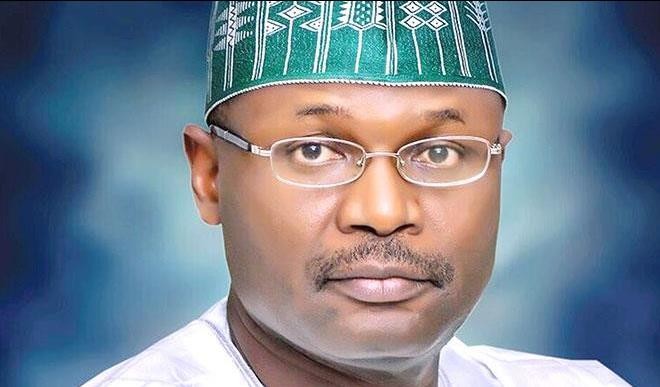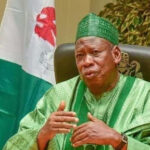“Uneasy lies the head that wears a crown,’ penned William Shakespeare in one of his literary masterpieces. The assertion vividly captures the leadership of the Independent National Electoral Commission (INEC) since its inception in 1998.
Set-up in 1998 by the then Head of State, Abdulsalami Abubakar, as a successor to the defunct National Electoral Commission of Nigeria (NECON), INEC is charged with overseeing elections and political parties in Nigeria.
Since its inception in 19998, the commission has been chaired by five men.
Apart from Professor Attahiru Jega, the four other chairmen conducted one general election each. At varying degrees, their careers in the commission were apparently “uneasy” while the elections they conducted had encountered a lot of criticisms for lack of preparedness, as well as not meeting acceptable global best practices.
Justice Ephraim Akpata (1998-2000)

Justice Ephraim Akpata was the first chairman of the Independent National Electoral Commission (INEC) for the 1998/1999 elections that ushered in the Fourth Republic and democratic rule in Nigeria on May 29, 1999. He was appointed to head INEC in 1998 by General Abdulsalami Abubakar.
As the pioneer INEC chairman, Akpata had to contend with many teething problems of the electoral body and Nigeria’s new democracy, such as the registration of political parties, campaign rules, conduct of politicians and the elections themselves.
For instance, Akpata ruled that only parties with broad-based national support would be allowed to contest elections. He also mandated that political parties must win local government seats in at least 10 states to qualify for the governorship, state assembly, national assembly and presidential elections.
Of 26 political associations, he gave provisional registration, as political parties, to only nine for the 1998/1999 elections. At last, only three – AD, APP and PDP – qualified to contest state-wide elections.
Akpata also lampooned the process through which some of the political parties selected their candidates, as “short of the level of transparency expected from a democratic process.”
Despite his efforts, the 1998/99 elections were criticized by both national and international observers.
Akpata, a former Justice of the Supreme Court of Nigeria from Edo State, died on 8 January 2000 at the age of 72.
Dr. Abel Guobadia (2000-2005)

Following Akpata’s death in 2000, then President Olusegun Obasanjo appointed Dr. Abel Guobadia, a US trained Solid State Physics expert also from Edo State, as INEC’s second chairman.
Guobadia conducted the 2003 elections, which recorded a higher turn-out than those of 1998/99 but were, however, marred by widespread violence and other irregularities.
Surprisingly, Guobadia retired as INEC chairman in May 2005, becoming the first chairman of an electoral commission since Nigeria’s independence in 1960, to complete his tenure. Such feat was only recorded again in 2015 by Professor Attahiru Jega.
Professor Maurice Iwu (2005-2010)

Following Iwu’s ouster, President Goodluck Jonathan nominated the renowned political scientist from Kebbi State, Professor Attahiru Jega, as the new INEC chairman on 8th June 2010.
Many Nigerians saw Jega’s nomination as a quantum leap, not only to Iwu’s integrity battered INEC, but also in line with the promised electoral reforms of Yar’adua/Jonathan presidency.
Aside from the post-election skirmishes that trailed the 2011 general elections in some northern states, both the 2011 and 2015 elections conducted by the Attahiru Jega-led INEC were acknowledged as free and peaceful by international and local observers.
Nevertheless, Jega was criticized by both the opposition and the ruling party in the run-up to the 2015 general elections.
Upon the expiration of his tenure on 31 June 2015, Jega voluntarily bowed out from INEC despite chances of having his appointment renewed.
Professor Attahiru Jega (2010-2015)

Following Iwu’s ouster, President Goodluck Jonathan nominated the renowned political scientist from Kebbi State, Professor Attahiru Jega, as the new INEC chairman on 8th June 2010.
Many Nigerians saw Jega’s nomination as a quantum leap, not only to Iwu’s integrity battered INEC, but also in line with the promised electoral reforms of Yar’adua/Jonathan presidency.
Aside from the post-election skirmishes that trailed the 2011 general elections in some northern states, both the 2011 and 2015 elections conducted by the Attahiru Jega-led INEC were acknowledged as free and peaceful by international and local observers.
Nevertheless, Jega was criticized by both the opposition and the ruling party in the run-up to the 2015 general elections.
Upon the expiration of his tenure on 31 June 2015, Jega voluntarily bowed out from INEC despite chances of having his appointment renewed.
Prof. Mahmood Yakubu (2015-Date)

Professor Mahmood Yakubu, a guerrilla warfare expert from Bauchi State was appointed as the fifth INEC chairman by President Muhammadu Buhari on 21 October 2015.
He succeeded Amina Zakari, who had acted in that capacity since June 2015.
Yakubu came into the INEC job with an impressive record of intelligence as the first and, to date, only Nigerian from the North to obtain a first-class degree in history; however, the task before him might have proven to be quite a different ball game.
Analysts have insisted that it would be premature to pass judgment on Yakubu’s INEC, especially as the country’s chief electoral officer has not conducted any general election since assuming office.
But according to observers and opposition parties, the staggered elections Yakubu’s INEC have conducted, especially in Ekiti and Osun, were retrogression from the gains made in free and fair election in 2011 and 2015.
Added to that was the last-minute postponement of last Saturday’s presidential and National Assembly elections, which has again put Yakubu on the spotlight. In all, the 2019 general elections prove to be a huge, ultimate litmus test for Yakubu’s INEC.

 Join Daily Trust WhatsApp Community For Quick Access To News and Happenings Around You.
Join Daily Trust WhatsApp Community For Quick Access To News and Happenings Around You.


